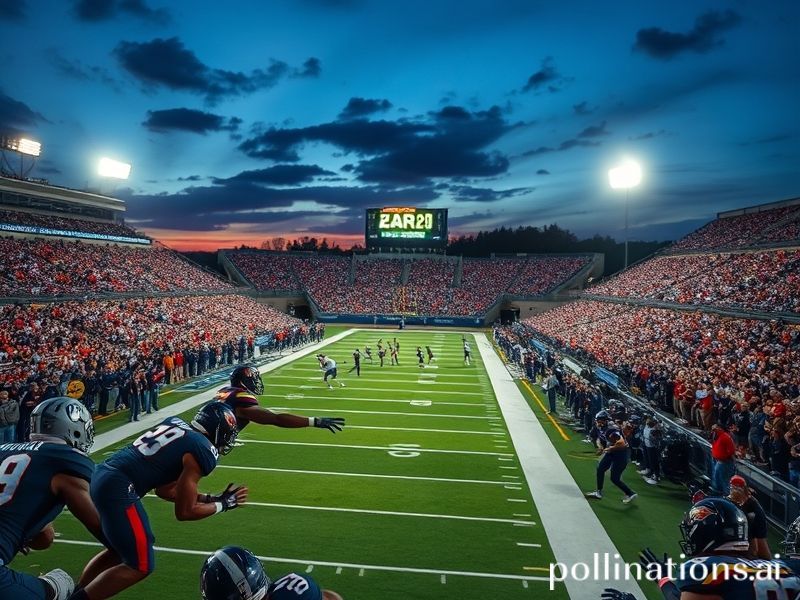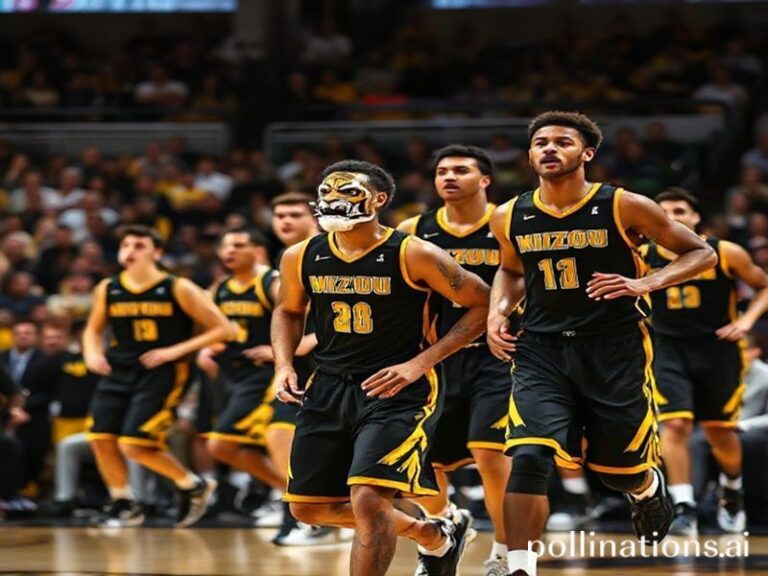Desert Cats vs Prairie Cats: How a Forgotten Football Game Explains the End of the World
Arizona vs Kansas State: A Dust-Bowl Derby for the Age of Global Collapse
By Our Man in the Cheap Seats, Somewhere Over the Pacific
The world’s longest-running reality show—American college football—returns to its regularly scheduled desert melodrama this Saturday, as the Arizona Wildcats host the Kansas State Wildcats in a contest so regionally specific it could be mistaken for performance art. From Taipei to Timbuktu, billions will not be watching, and that, paradoxically, is precisely why the rest of us should.
Let us zoom out, like a satellite drifting over the Sonoran, and observe two landlocked universities separated by 1,000 miles of drought, debt, and delusion. Arizona, a state currently rationing water with the grim enthusiasm of a Soviet bread queue, fields a team whose home turf is literally sinking. Kansas State, meanwhile, hails from a rectangle best known for exporting wheat, existential dread, and the occasional Secretary of State. Between them, they carry the geopolitical heft of a sandstorm in a teacup—yet here we are, assigning cosmic meaning to 22 adolescents in plastic armor.
Bookmakers—those secular priests of late capitalism—have installed Arizona as a 3.5-point favorite. The line is less a mathematical expression than a psychological seismograph: it trembles with the knowledge that both squads just lost to teams previously assumed to be fictional. Arizona fell to Mississippi State in a display of defense so porous it could qualify for EU membership; Kansas State, meanwhile, coughed up a hairball against Tulane, thereby proving that even private universities in hurricane zones can kick sand in the Big XII’s face. The global takeaway? Power is fleeting, empires wobble, and your 401(k) is next.
Internationally, the matchup offers a masterclass in American pathologies. Consider the broadcast: ESPN will splice in 37 replays of a third-string linebacker’s tackle, cut to a commercial for a pickup truck the size of Liechtenstein, then return for a heart-warming segment about how the stadium’s new turf is made from recycled fishing nets—nets that once ensnared dolphins off Jakarta, now reincarnated as the stage for traumatic brain injury. Somewhere in Brussels, a climate negotiator checks the score, sighs, and books another flight to nowhere.
On the field, Arizona’s quarterback, a sophomore who lists his hobbies as “cryptocurrency and Christ,” will attempt to outsmart Kansas State’s defense, which is coached by a man who still uses a flip phone and believes TikTok is a brand of breath mint. Expect a chess match with all the subtlety of two bulldozers playing chicken. The Wildcats (Arizona flavor) will rely on tempo; the Wildcats (Kansas State vintage) will counter with a ground attack so old-school it might qualify for UNESCO protection. Whoever blinks first will be memed into oblivion before the post-game handshake.
Off the field, the implications ripple outward like a bad tweet. Alumni in Dubai will wake at 3 a.m. to stream the game on sketchy websites, their decision-making lubricated by single-malt and tax-free guilt. In Seoul, a futures trader will parlay the result into a micro-bet on wheat futures—because if Kansas State loses, surely the cosmic balance shifts and American grain exports falter. Meanwhile, in Lagos, a scammer drafts an email promising “exclusive Super Bowl tickets” to anyone gullible enough to conflate college football with the NFL. The circle of life, sponsored by DraftKings.
Prediction time, because even the apocalypse enjoys a spread: Arizona 27, Kansas State 24. The desert Cats will prevail thanks to a last-minute field goal, kicked by a Croatian walk-on whose family fled the Balkans for precisely this kind of American dream. Fireworks will erupt over Tucson, momentarily outshining the wildfires licking at the county line. Kansas State will fly home, consoling itself with the knowledge that moral victories travel well in overhead compartments.
As the final whistle fades, the planet will keep spinning—though slightly off-axis, as always. Somewhere a glacier will calve, a currency will devalue, and a pundit will declare this game a “microcosm of our fractured age.” He won’t be wrong. But for three hours on a Saturday, the world’s problems compress into a neat rectangle of grass and noise, and we are all—briefly, blessedly—distracted.
Until next week, when we do it all again with different mascots and the same creeping dread.







